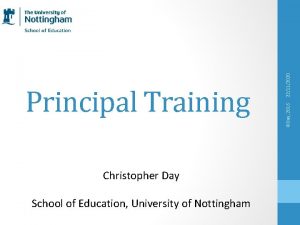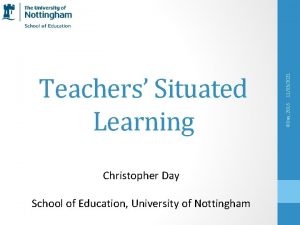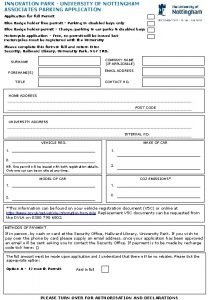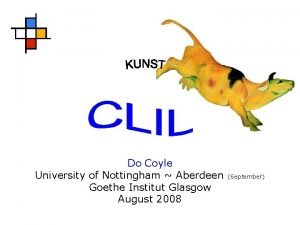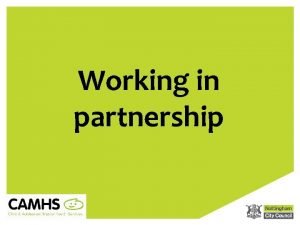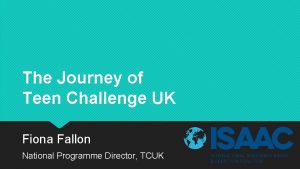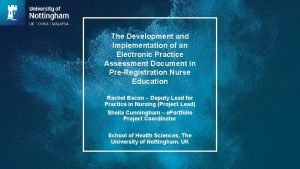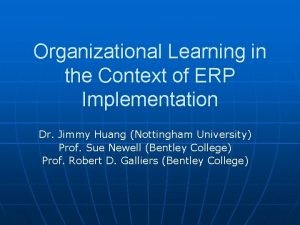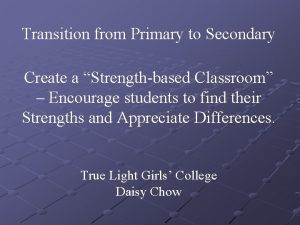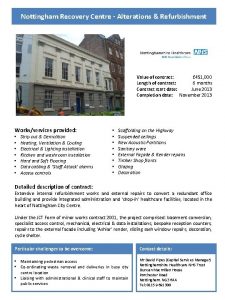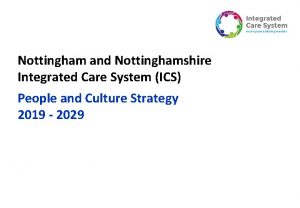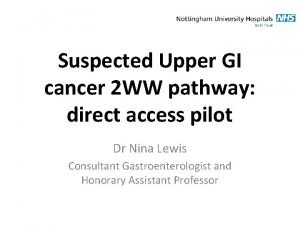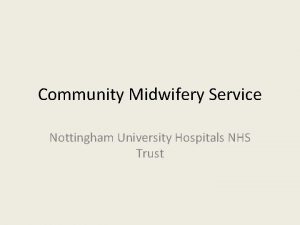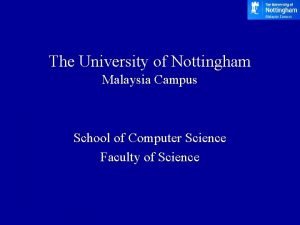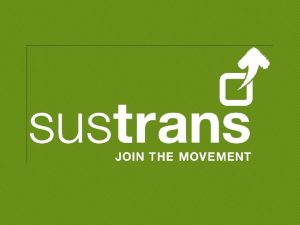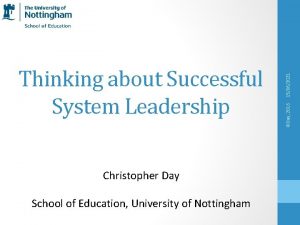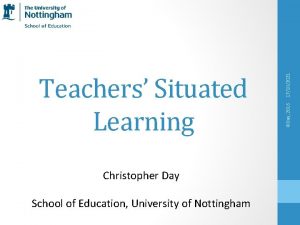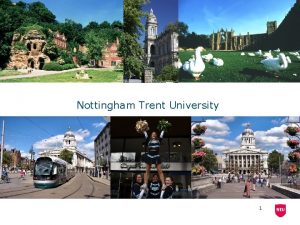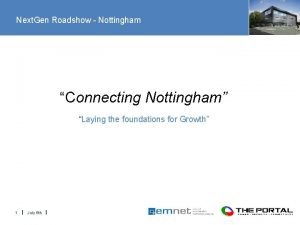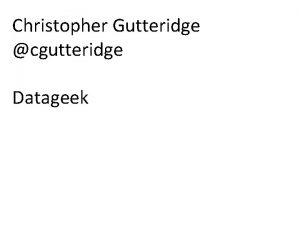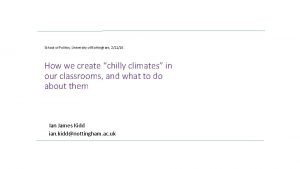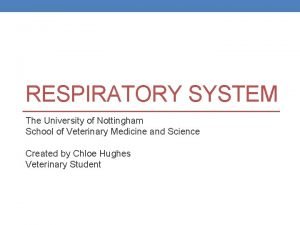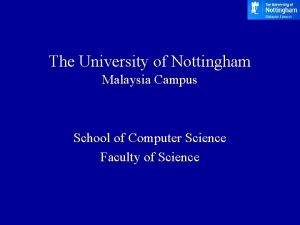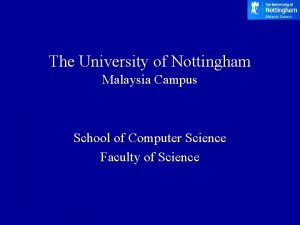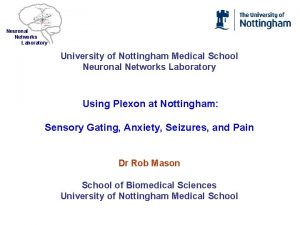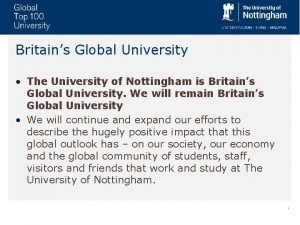Christopher Day School of Education University of Nottingham


























- Slides: 26

Christopher Day School of Education, University of Nottingham 26/10/2021 ©Day, 2016 Effective Principal Practices

26/10/2021 ©Day, 2016 1. What We Know From Research

(Levin, 2012) ©Day, 2016 • Establish a vision and goals • Build a strong team • Create and support the right culture • Communicate vision, direction • Recruit, retain and develop leaders • Build internal and external support • Maintain focus on teaching and learning 26/10/2021 Effective Leaders

©Day, 2016 The most recent empirical research indicates clearly that: 1. Leaders’ values are an important driver and influencing factor 2. Successful leadership is always accompanied by effective management 3. Successful leaders combine the ‘transformational’ and ‘instructional’ within transformative national agendas 4. Successful leadership is time and situation sensitive 5. Successful leaders build professional capital (social, decisional and individual) 6. Successful leaders place a premium on ‘functional’ and ‘attitudinal’ professional learning and development 7. Successful leaders develop trust 8. Successful Leaders are emotionally literate as well as academically wise 9. Successful leaders are resilient ( Marks & Printy, 2003, Hallinger, 2010, Day et al. 2010) 26/10/2021 Leadership Values, Qualities and Actions are Important over Style

Bullet pointed lists of strategies which may help to achieve success can never fully represent how leaders achieve and sustain success: too many ‘shoulds’ and not enough ‘hows’. • Acknowledgement that success is relative (to the history and present context of the school and its environment), that successful leaders are driven by intentions that are associated with ‘beliefs’, ‘knowledge’ and ‘skills’ and their application in specific contexts at particular times and with particular individuals and groups, and that successful improvement processes are both multilayered and time related… © Day, 2014 (Day, 2007: 47) ©Day, 2016 • 26/10/2021 Strategies are not enough

2. Develop Others Professional Capital Teacher Quality Teacher Effectiveness © Day, 2014 Commitment & Expertise ©Day, 2016 Professional Autonomy 26/10/2021 School Leadership

©Day, 2016 Successful school leaders improve teaching and learning and thus pupil outcomes … most powerfully through their influence on staff motivation, commitment, teaching practices and through developing capacities for teacher leadership. (Day, Sammons, Hopkins, Harris, Leithwood et al. , 2009) 26/10/2021 3. Prioritise Professional Learning and Development

©Day, 2016 …. successful school leadership creates conditions that support effective teaching and learning and builds capacity for professional learning and change……structures and organisational processes that empower staff and students, encourage broad participation in decisionmaking, and foster shared accountability for student learning. (Hallinger and Heck, 2010: 97) 26/10/2021 4. Leadership and Learning

5. Build Trust/Share Leadership 1 Leader makes decision and announce s it. 2 Leader decides and 'sells' benefits of decision. 3 Leader decides but presents thinking, inviting exploratio n. 4 5 Leader presents tentative problem, decision, gets prepared to suggestion change. s, makes decision. 6 Leader defines problem, asks group to make the decision. Principal-Centred Leadership------> Teacher-Centred Leadership (Original Tannenbaum and Schmidt terminology) 7 Leader allows group to define problem and make decision. ©Day, 2016 Area of freedom for teachers & leaders 26/10/2021 Use of authority by Principal

©Day, 2016 i. Trust is important for social and economic well-being, for enhancing social cohesion and ii. Strengthening resilience, and for maintaining security and order in our societies. iii. Trust is the foundation upon which social capital is built and it also is intimately related to human capital. 26/10/2021 Why trust is important

© Day 2016 26/10/2021 ©Day, 2016 • Trust is essential for the progressive and effective distribution of leadership. It is closely associated with a positive school ethos, improved conditions for teaching and learning, enhanced sense of teacher classroom agency and sustained improvement in pupil behaviour, engagement and outcomes.

The Benefits of Relational Trust 1. Interpersonal respect e. g. civility, deep listening to others ’ concerns, inclusive processes 2. Personal regard for others e. g. extent of caring about staff 3. Role competence e. g. ability to do one ’s job well, Well, including addressing competence 4. Personal integrity e. g. puts children ’s interests above own personal and political Political interests; walks the Talk; talk; communicates accurately More positive teacher attitude to innovation and risk Relational Trust involves a willingness to be vulnerable to another party based on one ’s confidence that person will fulfil Important obligations and expectations relevant to the shared task of educating children. Principal Teacher (Teacher – Parent – Students) More teacher outreach to parents/students e. g. parents are invited to visit classrooms to observe the teaching programme Enhanced commitment To the school Academic Outcomes 26/10/2021 Determinants of Relational Trust Consequences of High Relational Trust for Students Improving trends in student gains in reading and maths achievement associated with high rather than low trust schools Social Outcomes In high trust schools students more likely to report feeling safe, that teachers care about them and that they experience greater academic challenge e. g. staff loyalty, parent recommendations of school Enhanced professional community e. g. more focus on student ; earning, more collaboration around teaching © Day 2016 ©Day, 2016 Consequences of High Relational Trust for School Scholl Organisation (Robinson, 2007)

The Progressive Distribution of Trust Diagnosis of trust history Actions which earn trust and reduce distrust 26/10/2021 Growth of personal and relational trust ©Day, 2016 Initial/Provisional trust School members experience success Growth of organisational trust Consequence of trust: A learning and achieving community for all © Day 2016

©Day, 2016 i. Leadership needs to be distributed to those who have, or can develop, the knowledge and expertise required to carry out the leadership tasks expected of them. ii. Effective distributed leadership needs to be coordinated in a planned way. iii. It also needs a principal who is capable of identifying prospective leaders and is willing to distribute control, decision making and accountability with trust. 26/10/2021 6. Conditions for Distributing Leadership

• Different forms of distribution may be appropriate for schools which are in different development phases ©Day, 2016 • The forms, purposes and extent of distribution vary on a continuum from delegation with low trust to distribution with high trust 26/10/2021 However!

©Day, 2016 Initial Phase • Improve the school’s physical environment in order to create more positive conditions that give more support • Define, transmit and implement student behaviour patterns that will be consistent throughout the school • Restructure their senior leadership team, their roles and responsibilities • Implement performance management systems for all employees, having the effect of promoting greater distribution of leadership and lead to the development of a set of organisational values • Build trust 26/10/2021 7. Leadership Phases

Later Phase • Use strategies linked to customising and enriching the curriculum • Ensure a wider distribution of leadership 26/10/2021 ©Day, 2016 Intermediate Phase • Prioritise a wider distribution of roles and leadership responsibilities • Build trust • Implement a more regular and targeted use of data to support decision making on progress and student achievement • Expect the learning objectives to be used and targets to be defined

Phase 2: Developmental Phase 3: Enrichment Phase 4: Renewal © Day 2016 ©Day, 2016 Phase 1: Foundational 26/10/2021 8. School Improvement Phases: IMPACT Project

(Sun & Leithwood, 2015) ©Day, 2016 Emotional Path Power Index • Teacher trust in others (school culture, principal) P 1=0. 65 (of this, student correlation = 0. 28) • Teacher commitment (caring, belief in organisation, value of learning, identification with student) P 1=0. 92 (of this, student achievement correlation = 0. 30) • Organisational citizenship behaviour (altruism, conscentiousness, civic virtues, teachers treated as professional, autonomy, protection from administrative trivia, high levels of academic success) P=0. 89 (of this, student achievement correlation = 0. 41) 26/10/2021 9. Understand Manage Emotions

©Day, 2016 • Creation of an inclusive community; • emphasis on relationships and ethic of care; • creation of shared meanings and identities through the professional culture of the school; • staff development programmes and arrangements for teaching; • learning and assessment which encourage dialogue; • a discourse of the personal; • reciprocity of learning; • encouraging new approaches to learning; • remaining restless about contemporary understandings of leadership and management. (Day and Leithwood, 2007: 184) 26/10/2021 10. Create Person and Task Centred Communities

11. Leader Resilience Knowledge + Skills +Moral Purpose + Commitment + Resilience Sustained Effectiveness © Day, 2014 ©Day, 2016 Knowledge + Skills + Commitment Effectiveness? 26/10/2021 Knowledge + Skills Effectiveness?

(Leithwood and Seashore Louis, 2012: 1) © Day, 2014 26/10/2021 ©Day, 2016 Leader confidence or self-efficacy is likely the key cognitive variable regulating leader functioning in the dynamic environment of their schools…every major review of the leadership literature lists self-confidence as an essential characteristic for effective leadership.

(Loehr and Schwartz, 2003: 5) ©Day, 2016 Leaders are the stewards of organizational energy [resilience]…they inspire or demoralize others, first by how effectively they manage their own energy and next by how well they manage, focus, invest and renew the collective energy [resilience] of those they lead. 26/10/2021 Organisational Energy

i. Academic optimism ii. Trust iii. Hope iv. Moral purpose v. Passion ©Day, 2016 26/10/2021 Essential Components of Principal Resilience

©Day, 2016 26/10/2021

christopher. day@nottingham. ac. uk 26/10/2021 ©Day, 2016 Thank You!
 Christopher day nottingham
Christopher day nottingham Christopher day nottingham
Christopher day nottingham Day 1 day 2 day 3 day 4
Day 1 day 2 day 3 day 4 Mandy can i help you mandy wanted to know
Mandy can i help you mandy wanted to know University of nottingham parking permit
University of nottingham parking permit Do coyle
Do coyle Day 1 day 2 day 817
Day 1 day 2 day 817 Citizen portal nottingham
Citizen portal nottingham St christopher primary school coventry
St christopher primary school coventry St christopher school coventry
St christopher school coventry Bemh nottingham
Bemh nottingham Fallon sherrock smoking
Fallon sherrock smoking Pebble pad nottingham
Pebble pad nottingham Jimmy huang nottingham
Jimmy huang nottingham Dsl network nottingham
Dsl network nottingham Nottingham city council works perks
Nottingham city council works perks Beht nottingham
Beht nottingham Learning pit james nottingham
Learning pit james nottingham Nottingham private rented assistance scheme
Nottingham private rented assistance scheme Nottingham recovery centre
Nottingham recovery centre Nottingham and nottinghamshire ics
Nottingham and nottinghamshire ics Stacy johnson nottingham
Stacy johnson nottingham Dr nina lewis nottingham
Dr nina lewis nottingham Woodview children's home nottingham
Woodview children's home nottingham Bestwood and sherwood midwifery
Bestwood and sherwood midwifery Vanguard plus
Vanguard plus Nottingham progression flow chart
Nottingham progression flow chart
